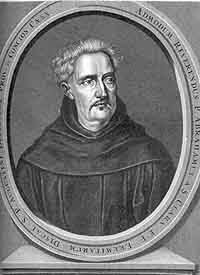Augustinians
Augustinians are members of Christian religious orders that follow the Rule of Saint Augustine, a short set of guidelines for communal life given by Saint Augustine of Hippo. The term "Augustinian" encompasses several distinct orders within the Roman Catholic Church and other Christian denominations, including the Order of Saint Augustine (O.S.A.), the Augustinian Recollects, and the Augustinian Canons, among others.
History[edit | edit source]
The origins of the Augustinian movement can be traced back to the 4th century when Saint Augustine, Bishop of Hippo, laid out principles for communal living in his works, particularly in the Rule of Saint Augustine. However, the formal establishment of the Augustinian Order did not occur until the 13th century. In 1244, several communities of hermits living in Tuscany received papal approval from Pope Innocent IV to unite under the Rule of Saint Augustine, marking the official foundation of the Order of Saint Augustine.
Rule of Saint Augustine[edit | edit source]
The Rule of Saint Augustine is notable for its emphasis on community life, mutual care, and sharing of goods. It advocates for a life dedicated to prayer, work, and communal living, underlining the importance of living harmoniously as brothers. The Rule is concise but profound, focusing on the spiritual and practical aspects of monastic life.
Orders and Congregations[edit | edit source]
Order of Saint Augustine (O.S.A.)[edit | edit source]
The Order of Saint Augustine is the primary and largest group of Augustinians. Its members are involved in various ministries, including educational, pastoral, and missionary work. They operate schools, universities, and parishes around the world, contributing significantly to the educational and spiritual life of the communities they serve.
Augustinian Recollects[edit | edit source]
The Augustinian Recollects originated in the 16th century as a reform movement within the Order of Saint Augustine, seeking a more austere and contemplative life. They were formally recognized as a separate congregation in 1912 and continue to focus on contemplative life, missionary work, and education.
Augustinian Canons[edit | edit source]
The Augustinian Canons, also known as Canons Regular of Saint Augustine, live a life that combines the monastic tradition with clerical ministry. They are involved in parochial and educational work, living in community under the Rule of Saint Augustine but serving in various capacities within the Church.
Spirituality[edit | edit source]
Augustinian spirituality centers on the search for God through community life, the interior life, and service to others. It is characterized by a deep sense of community, a love for the Church, and a commitment to the pursuit of truth and the dissemination of knowledge.
Influence[edit | edit source]
The Augustinians have had a significant impact on the Catholic Church and society through their educational institutions, missionary work, and theological contributions. Notable Augustinians include Saint Augustine himself, Gregor Mendel, the father of modern genetics, and Martin Luther, who was an Augustinian monk before initiating the Protestant Reformation.
See Also[edit | edit source]
Search WikiMD
Ad.Tired of being Overweight? Try W8MD's physician weight loss program.
Semaglutide (Ozempic / Wegovy and Tirzepatide (Mounjaro / Zepbound) available.
Advertise on WikiMD
|
WikiMD's Wellness Encyclopedia |
| Let Food Be Thy Medicine Medicine Thy Food - Hippocrates |
Translate this page: - East Asian
中文,
日本,
한국어,
South Asian
हिन्दी,
தமிழ்,
తెలుగు,
Urdu,
ಕನ್ನಡ,
Southeast Asian
Indonesian,
Vietnamese,
Thai,
မြန်မာဘာသာ,
বাংলা
European
español,
Deutsch,
français,
Greek,
português do Brasil,
polski,
română,
русский,
Nederlands,
norsk,
svenska,
suomi,
Italian
Middle Eastern & African
عربى,
Turkish,
Persian,
Hebrew,
Afrikaans,
isiZulu,
Kiswahili,
Other
Bulgarian,
Hungarian,
Czech,
Swedish,
മലയാളം,
मराठी,
ਪੰਜਾਬੀ,
ગુજરાતી,
Portuguese,
Ukrainian
Medical Disclaimer: WikiMD is not a substitute for professional medical advice. The information on WikiMD is provided as an information resource only, may be incorrect, outdated or misleading, and is not to be used or relied on for any diagnostic or treatment purposes. Please consult your health care provider before making any healthcare decisions or for guidance about a specific medical condition. WikiMD expressly disclaims responsibility, and shall have no liability, for any damages, loss, injury, or liability whatsoever suffered as a result of your reliance on the information contained in this site. By visiting this site you agree to the foregoing terms and conditions, which may from time to time be changed or supplemented by WikiMD. If you do not agree to the foregoing terms and conditions, you should not enter or use this site. See full disclaimer.
Credits:Most images are courtesy of Wikimedia commons, and templates, categories Wikipedia, licensed under CC BY SA or similar.
Contributors: Prab R. Tumpati, MD

